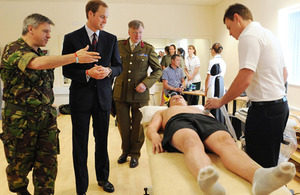Prince William opens new rehabilitation complex at Headley Court
Prince William attended the opening ceremony of the new gym and pool rehabilitation complex at the Defence Medical Rehabilitation Centre (DMRC) in Headley Court today, Friday 4 June 2010.

His Royal Highness Prince William meets patients during a tour of the new facilities at the Headley Court Defence Medical Rehabilitation Centre [Picture: Ben Stansall, PA Wire/2010]
The Prince gave a short speech before touring the new facilities, including the swimming pool, where he saw a rehabilitation class in action.
The multi-million pound complex was part funded by £8m raised by the charity Help for Heroes, with the remainder provided by the Ministry of Defence. The construction of the new complex was managed by Defence Estates.
The new complex houses a 25-metre swimming pool with five lanes and a moveable floor which extends the depth of the pool to 1.8 metres. The pool is also fitted with counter-current swimming jets, a jacuzzi and an AquaJogger.
The refurbished Battle of Britain gymnasium has been fitted with a sports-sprung floor and the new gymnasium on the first floor has a cardiovascular suite with two anti-gravity treadmills.
In addition, the complex has been kitted out with a gait laboratory for research and analysis of patients’ gaits and biomechanical studies.
There are also treatment areas for physiotherapy and consulting rooms for doctors to discuss rehabilitation progress with patients.
In attendance at the opening ceremony was Minister for Defence Personnel, Welfare and Veterans, Andrew Robathan, who said:
As one of my first engagements I am delighted to attend the opening of this magnificent rehabilitation complex at Headley Court. The new gym and pool complex has come about thanks to the wonderful support from Help for Heroes and all the people who have supported the charity.
I recently visited Headley Court and was genuinely humbled by the stamina and strength of spirit of the personnel who receive treatment at the centre and the professionalism and dedication of the staff who work there.
Defence Medical Rehabilitation Centre Commanding Officer, Colonel Jerry Tuck, said:
On behalf of Defence and the staff and patients of DMRC Headley it is a privilege to receive the key to the new Help for Heroes rehabilitation complex.
Today’s opening ceremony marks the symbolic finish of this groundbreaking project which is a fabulous expression of support for Service personnel by the people of the UK who have put so much imagination, effort and enthusiasm into making this a reality.
I wish to thank Help for Heroes for their efforts and wish them every success in their continuing work on behalf of Service personnel who have been injured in the service of their country.
Help for Heroes Chief Executive Officer and co-founder, Bryn Parry, said:
Today there are patients swimming in the Headley Court Help for Heroes swimming pool. It is a historic day for Help for Heroes and we are deeply grateful to everyone who has made this dream a reality.
Defence Estates Project Manager, Phil Eley, who was responsible for building the new complex ahead of schedule, said:
The project team strived to complete the facility as quickly as possible to enable the patients and staff of the Defence Medical Rehabilitation Centre to benefit from the new facility at the earliest opportunity, whilst recognising the need to deliver a facility of outstanding quality that met the aspirations of Help for Heroes.
The DMRC has been the premier facility for the rehabilitation of injured Service personnel since the Second World War.
There is a long-standing history of charitable involvement in Headley Court. Originally it was developed as a rehabilitation centre for aircrew and officers following a collection and donation of monies during the Second World War.
In 1984 it opened its doors to personnel of all ranks and Services. It became the main tri-Service rehabilitation centre in 1996 with the consolidation of the then rehabilitation facilities.
Since 2002 it has played a central role delivering rehabilitation as part of a Service-wide network of 14 medical Regional Rehabilitation Units.
The DMRC offers access to all aspects of rehabilitation with on-site consultants, physiotherapists, remedial instructors, occupational therapists, speech and language therapists, social workers, psychologists and a neuro-counsellor and mild traumatic brain injury programme.
It has gymnasiums and a large hydrotherapy pool to support the clinical departments.
The medical records department, workshops for the production of prostheses, and logistical and administration staff support the DMRC’s clinical role.